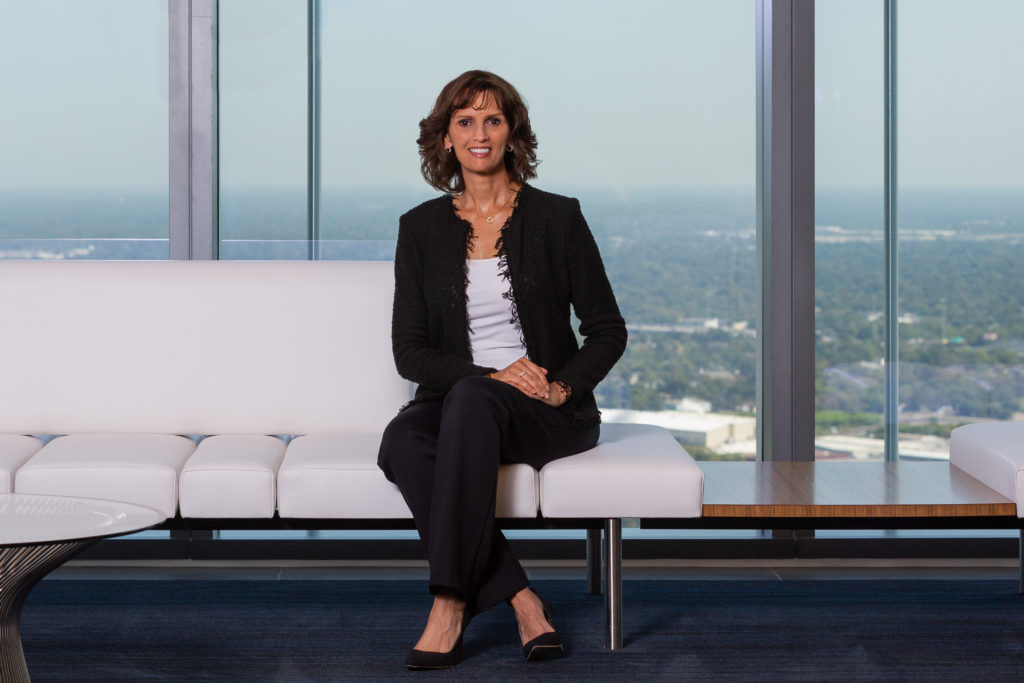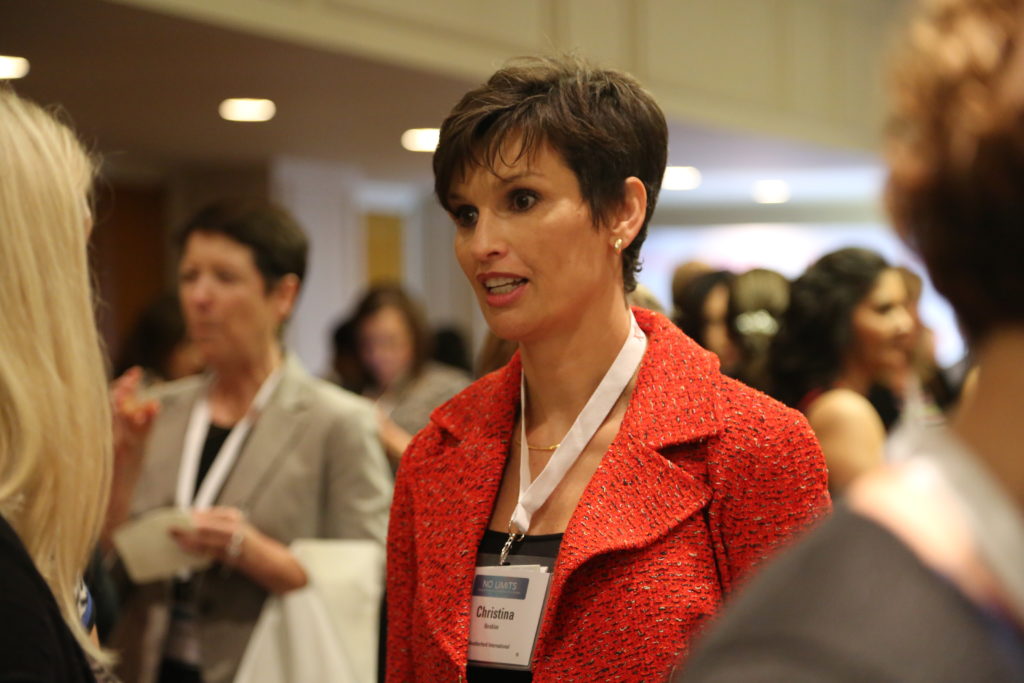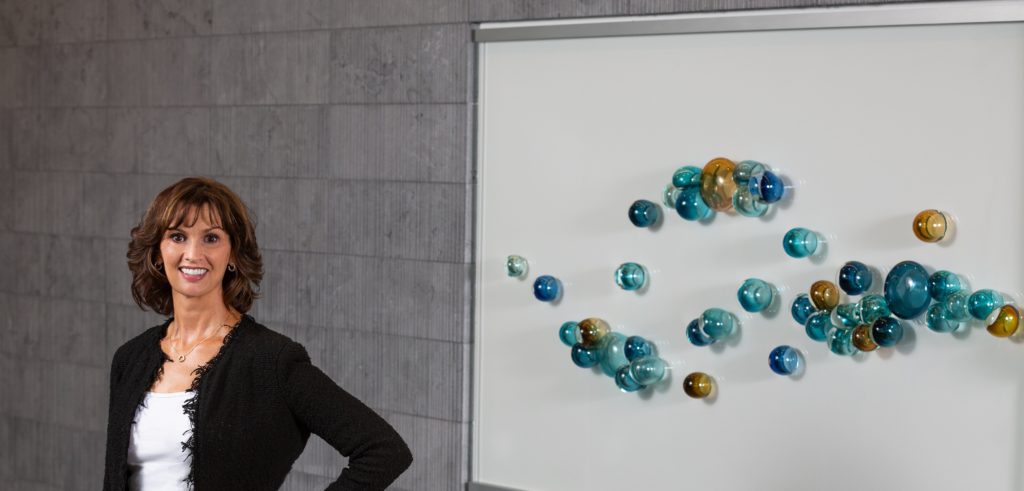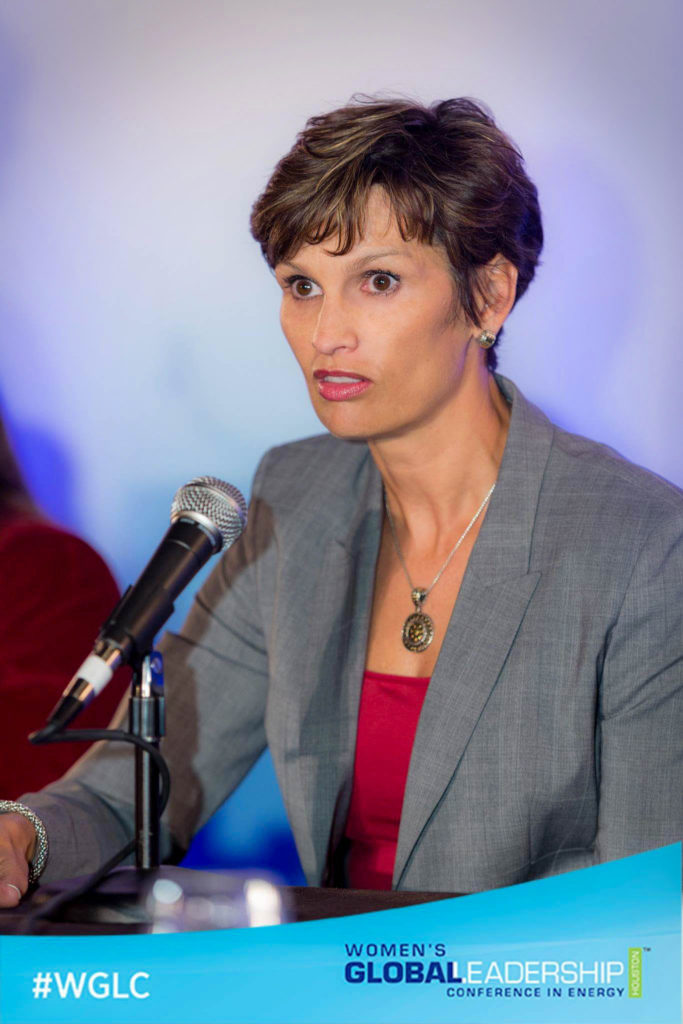
Listing Christina Ibrahim’s accomplishments as general counsel at Weatherford International for five years requires multiple pages. She has won dozens of awards and honors from organizations such as the Chamber of Commerce, the National Diversity Counsel and the Houston Business Journal.
During the past two years alone, Ibrahim and her team at the Houston-based global oil and gas services giant have:
- Guided the company through a successful multibillion-dollar corporate bankruptcy and restructuring that reduced its debt by more than $6 billion and secured $2.6 billion in exit financing;
- Handled the $287.5 million sale of oil rigs in Algeria, Kuwait and Saudi Arabia to ADES;
- Oversaw the sale of its laboratory and geological analysis business for $206 million;
- Guided the $50 million sale of its surface data logging business to Excellence Logging;
- Led the successful efforts to end early the U.S. Justice Department’s monitoring of the company for Foreign Corrupt Practices Act violations that occurred before her arrival at Weatherford; and
- Headed the legal effort to successfully resolve the U.S. Securities and Exchange Commission’s investment and related shareholder class action litigation regarding historical financial statements.
Ibrahim’s biggest achievement at Weatherford was much different, much deeper and much more important.
“My most important contribution was the results we achieved when I was named the chief transformational officer for culture,” she told The Texas Lawbook in an exclusive interview. “Changing the culture of the company, making it a better company, many employees more valued and hearing them more and creating a much more diverse legal department – those were meaningful successes.”
The Association of Corporate Counsel Houston and The Texas Lawbook agree. They are awarding Ibrahim with the 2020 Houston Corporate Counsel’s General Counsel of the Year Award for a Large Legal Department.
Premium Subscribers: Go here for an exclusive Q&A with Christina Ibrahim. She provides personal insights, how she selects outside counsel and key things outside counsel should know about her. For information on premium subscriptions, including marketing and advertising benefits please contact Brooks Igo at brooks.igo@texaslawbook.net .
“Christina embodies the qualities of an excellent leader and demonstrated the highest level of integrity,” said Jonathan Newton, a partner at King & Spalding who nominated Ibrahim for the honor. “Her passion for her work, her team and the community is inspirational. During the last four years, Christina’s leadership and legal expertise have proven indispensable as the multinational oil field services company faced the oil and gas industry downturn and now moves to the next stage on its global, companywide transformation process.
“Christina supported Weatherford in its efforts to improve the company’s debt and capital structure,” Newton said. “Initially, she managed a number of key financings and other debt matters that helped the company improve its financial standing. Christina and her legal team also executed a number of planned divestitures that helped Weatherford reduce debt in the past years.”
ACC Houston and The Texas Lawbook will honor Ibrahim and a dozen other leading corporate general counsel and senior in-house counsel in a virtual awards ceremony Dec. 10. More details to come.
“Chris is fearless,” said Cristina Rodriguez, a partner at Hogan Lovells in Houston who has worked with Ibrahim on multiple matters. “She spent the last few years of her career dealing with considerable business turmoil and poor market conditions, in a position that had previously turned over quickly.

“She brought a steady hand to her legal team and her clients,” Rodriguez said. “Chris has always been extremely pragmatic. I have been with her in tough negotiations that involve big egos and sensitive situations. Some clients will be sidetracked by the personal issues or the principle, without regard to what is best for their company. Chris keeps her eye on the prize.”
Billy Donley, a partner at BakerHostetler, said Ibrahim tackles legal and business challenges with a “practical and down-to-earth approach.”
“I’ve known Chris for almost 20 years and I am constantly impressed by her in-depth knowledge of the legal landscape,” Donley said. “She has an uncanny ability to take advantage of opportunities as they arise and to avoid the pitfalls. She knows how to set the right direction and then keep things moving in that direction.”
Ibrahim left Weatherford earlier this year and is currently a free agent – though likely not for long. She also serves on the board of directors for Denver-based PDC Energy, an exploration and production company.
“She immediately made a significant impact in the legal strength of the board and improved the overall governance knowledge” said PDC Energy Board Chairman Mark Ellis. “She was very instrumental in developing the legal talent of PDC and became the obvious choice to chair our Nomination and Governance Committee.
“When Chris engages in a conversation she commands attention and there is always value in her thoughts,” Ellis said. ‘She does an excellent job of providing insightful feedback to management and avoids getting into direct management of the company.”
For Ibrahim, her success comes from one motivation: “I love the law and solving problems,” she said.
‘Humble Beginnings’
Ibrahim was born in the small town of Dresden, Ohio. Her parents also were born there and were high school sweethearts. Her mom was a straight A student, homecoming queen and worked at the phone company until she was forced to quit because she got pregnant. She later worked for a law firm.
Her dad was “a straight C student” who was a star basketball player in high school who only went to college because his coach personally drove him to West Liberty State University to get a scholarship. Her dad borrowed the textbooks from the professor before tests because he could not afford to buy them.
No one from either side of her family had gone to college before.
“I come from humble beginnings where from the start my mom had less opportunity and was outright discriminated against because she was pregnant,” Ibrahim said. “Because she never had a chance to go to college, she insisted that both me and my sister attend and finish. Knowing that she never had a chance to go to college, despite being top of her class, made me determined to succeed and go on to law school.”
Her father going to college was a pivotal moment in the life of their family.
After graduation, the General Accounting Office – now the Government Accountability Office – gave her father a job and the family moved to Washington D.C., where her mom found a position as a legal secretary.
Ibrahim received a bachelor’s degree in business administration and finance, and she considered getting an MBA or a law degree.
“Law school was a natural path for many reasons,” she said. “If you asked my dad, it was because I love to argue the opposite position. I just like the law and endless opportunities to solve different problems or challenges. I especially love being in-house – part of the strategy to avoid or mitigate risk.”
While there were no lawyers in Ibrahim’s family – in fact, she was the first and only person in the family to go to graduate school – her mother’s experience working for a law firm had a significant impact.
“I think I have always wanted to be a lawyer because my mom worked for lawyers – all men – and as a child they seemed so important,” she said. “Hearing [my mother] talk about the lawyers who treated her with the respect and dignity and the ones who did not, because she was a woman and because she was ‘just’ a secretary. My mom and dad never treated anyone ‘less than’ for any reason. And knowing how certain professionals treated her has created a zero-tolerance for me.
“Ultimately, law school felt like a better fit for me,” she said. “I love the law and solving problems. The best of both presented itself as an in-house position. There I have been able to use my business acumen in conjunction with my legal experience.”
Ibrahim said she followed her husband to Texas, who went to Thurgood Marshall School of Law at Texas Southern University. She liked the mission of the school, which is to expand the opportunities for those underserved in the legal profession and prepare a diverse group of students for leadership roles in the legal profession, business and government.
After graduating from Texas Southern with a law degree, she joined Wickliff & Hall, a Houston minority-owned boutique, as an associate focusing on employment litigation.

In 1997, Halliburton leaders noticed Ibrahim, who then had two years of practice experience, working on some of its matters and offered her a position in the company’s in-house employment practice group.
“My career goal was to go in-house,” she said. “I like being part of the solution to avoid or manage the issue, problem [or] challenge. I was incredibly fortunate to have opportunity so early in my career.”
Over the 18 years that followed, Ibrahim was promoted and tackled new assignments. By 2014, she was corporate secretary and chief commercial counsel and responsible for all corporate governance and compliance, including all reporting to the SEC and the New York Stock Exchange.
“I was afforded the opportunity to move throughout the law department and gain the most comprehensive, broad experience possible,” she said. “It is an amazing company, and I have only gratitude for my time there.
“As chief commercial counsel, all the commercial or operational lawyers reported to me,” she said. “Having such a global scope was exhilarating. Every day was a new challenge and I thrived on the diversity of issues.”
‘Time for a New Challenge’
In 2015, Weatherford contacted Ibrahim to offer her the top legal job at the company.
“It was time for a new challenge,” she said.
Indeed, several challenges lied ahead. Weatherford was laden with a huge debt load and a less than ideal balance sheet.
The company made dozens of acquisitions in the years prior, but there had been little to no integration. The product lines ran like independent operations, instead of being part of a large companywide strategy.
But that changed in 2017 when one of Ibrahim’s former colleagues at Halliburton, Mark McCollum, was made CEO at Weatherford. McCollum brought energy and change to the company. He also gave Ibrahim the ability to restructure her 170-person legal department.
McCollum created a transformation executive team – partnering with McKinsey & Company and Seann Delaney – to fundamentally “transform and fundamentally improve the way Weatherford operated it business, lowered its cost structure and to strengthen its functions.”
Ibrahim said McCollum’s efforts also reshaped the culture to create a highly efficient accountable organization.
“My biggest and most important success as a department head was creating a cohesive, diverse law department that, by the time I left, was viewed as a strategic business partner,” she said. “Shifting the perception of the law department was an incredible challenge, but we accomplished it by ensuring we had the correct talent in place and then shaping the department’s culture and mindset to a business partner and not an enforcement department.”
Ibrahim started the company’s diversity and inclusion initiative, and she led the crisis management response to COVID-19. Corporate officials also added the oversight of the company’s global security operation and its internal audit team to Ibrahim’s responsibilities.
By all accounts, Weatherford was heading in the right direction from an operational and strategy standpoint. But the oil and gas market did not recover from lower prices as most experts predicted.
As a result, Weatherford missed its revenue projections in the fourth quarter of 2018. The company’s stock price plummeted.
“It was surprising how punitive the market was,” she said. “Suppliers wanted to be paid upfront. We could not do an equity deal. Everything was against us. We were out of options.”
Weatherford quietly put together a small team of executives to make plans for the bankruptcy filing.
Needing to keep the potential Chapter 11 restructuring confidential, only 20 people were part of the original team. Ibrahim hired Latham & Watkins as lead bankruptcy legal counsel and Hunton Andrews Kurth as local counsel. Alvarez & Marsal was selected as restructuring advisors.
To prevent other Weatherford employees from getting suspicious and so executives would not be seen meeting with bankruptcy lawyers, Ibrahim and the team used office space in the basement of the building next to Weatherford’s headquarters.
“There were so many moving parts,” she said. “We had 350 companies operating in 80 countries. There were a few 23-hour workdays, including most weekends. No one took vacation for the entire year. The company was on the line.

“My worst day [at Weatherford] was when the executive team collectively realized the company was headed towards bankruptcy,” she said. “Although our stock was worth pennies on the dollar, some employees had never sold. I was heartbroken that these lifelong employees of Weatherford had invested in company stock and filing bankruptcy which would result in wiping out the value of the stock. That was the hardest decision we ever made.”
Ibrahim said she hired the right team of outside advisors, which made the bankruptcy process significantly better. But she also heard stories from other general counsel who had been through the restructuring process and the so-called “bankruptcy cabal” – a group of legal and financial advisors who work together in dozens of bankruptcies and simply take over the decision-making from corporate leaders.
“My biggest fear was the bankruptcy cabal,” she said. “I told George Davis [of Latham] that I was not going to be a flower on the wall. It was important that I be involved in every decision and not just leave it to the advisors.”
Weatherford filed for Chapter 11 bankruptcy protection July 1, 2019, in the Southern District of Texas. The case was assigned to Chief Bankruptcy Judge David Jones. The company cited $8.34 billion in liabilities and $6.5 billion in assets. Weatherford also filed for bankruptcy in Ireland and Bermuda.
By all accounts, Weatherford’s restructuring was a success. The company exited bankruptcy Dec. 13 – less than six months after it filed. Weatherford reduced its debt to $6 billion and obtained $2.6 billion in exit financing facilities.
“It was an amazing learning experiences, but I never want to go through that ever again,” Ibrahim said. “There was a lot of carnage.”
Lawyers who work with Ibrahim said she is tough, tenacious and well-rounded.
“Chris has deep integrity and compassion, something she has always shown in my dealings with her,” Rodriguez of Hogan Lovells said. “During an investigation that I was conducting for her, I had a death in my family. Despite the time urgency and sensitivity involved, Chris officially put the investigation on hold and personally reached out to the complainant and witnesses to let them know what had happened. She made clear that family issues came first and that the investigation would resume when I was ready.”
A post-bankruptcy board of directors at Weatherford decided in early June 2020 that it wanted to install its own new leadership team. Ibrahim, McCollum and other executives left the company.
Ibrahim said she is taking a few months off, but she is definitely open to the right positions. Lawyers and executive placement firms say she will not be a free agent for too long.
“Christina Ibrahim has had a long and distinguished career in typically male-dominated oilfield services companies,” said Stacy Humphries, president of the Pye Legal Group in Houston. “Her success is due in no small part to her impressive balance of keen legal acumen and a high emotional quotient.
“Given the depth and breadth of Chris’s experience, she could transition easily to joining the board of directors in an energy-industry company, if she chooses to move in that direction in the future,” Humphries said.
Ibrahim said corporate general counsel face increasing challenges in the years ahead.
“In addition to increasing diversity in-house and with outside counsel, the pressure on cost and spend is not going away,” she said. “Working with our law firm partners on win-win solutions and innovative approaches to the work is going to be more and more needed.
“Also, the growing reach of privacy laws and how corporations manage the landscape,” she continued. “How to handle cybersecurity risks and disclosures. How we work remote, especially with on-boarding new lawyers and staff.”
